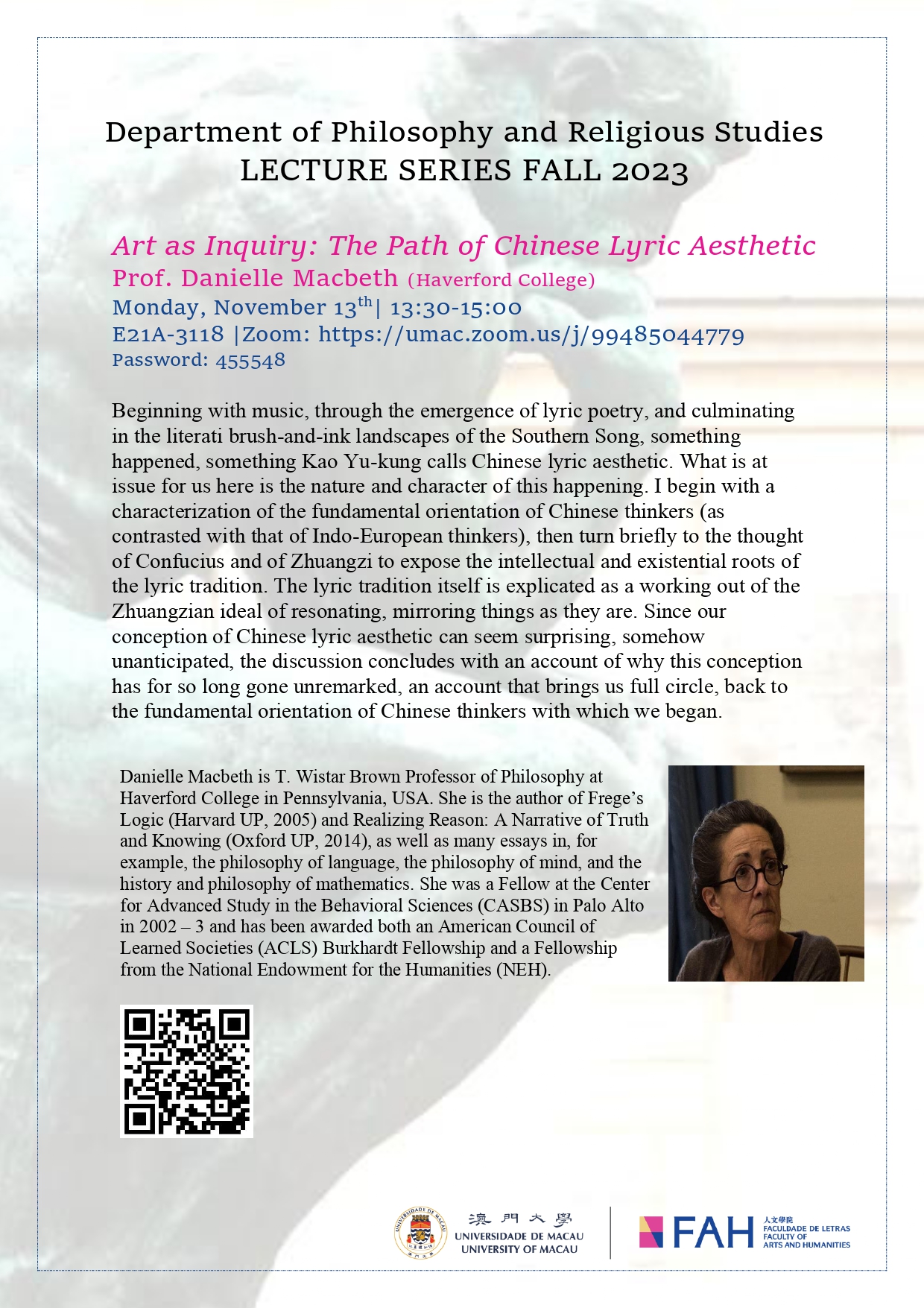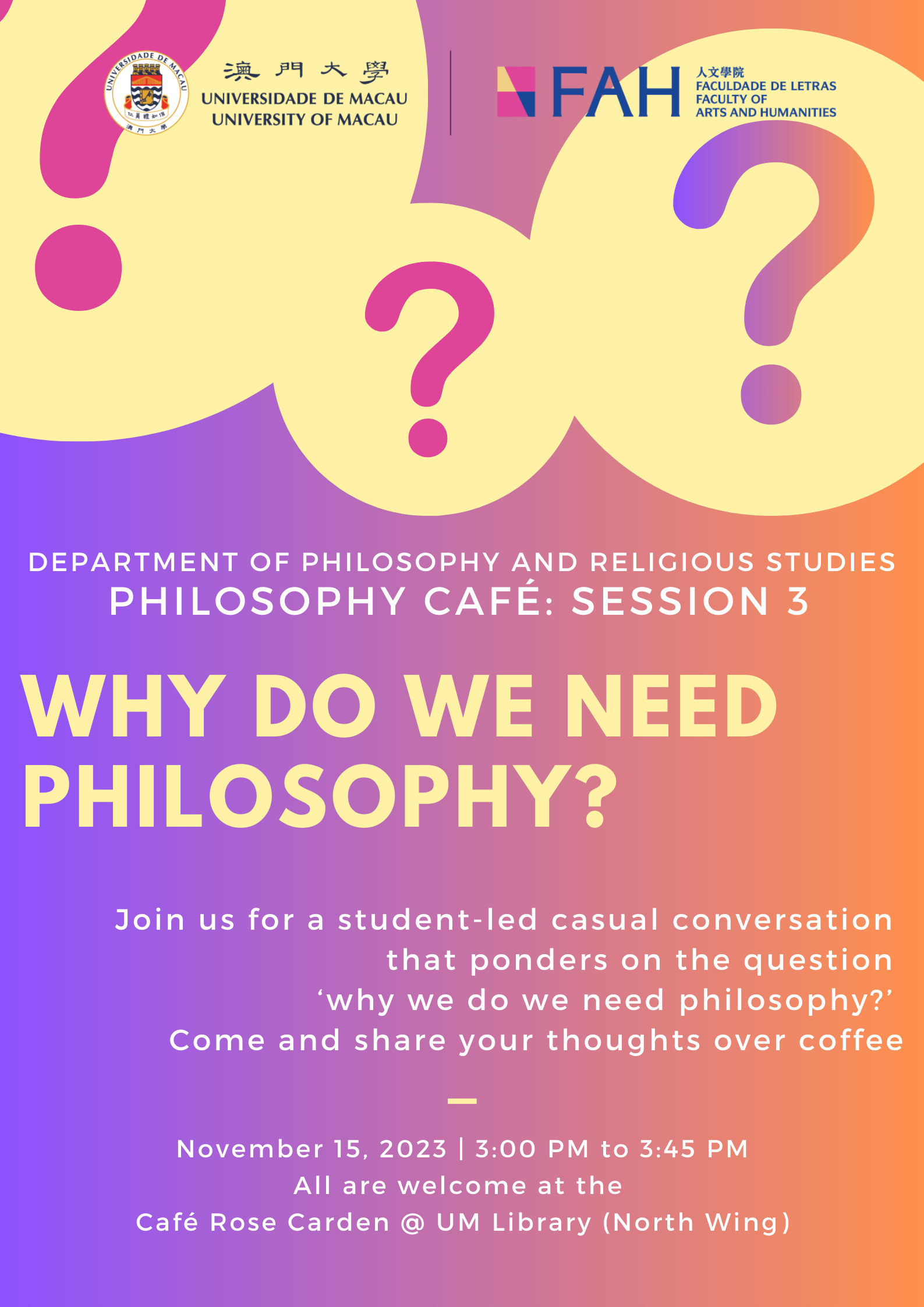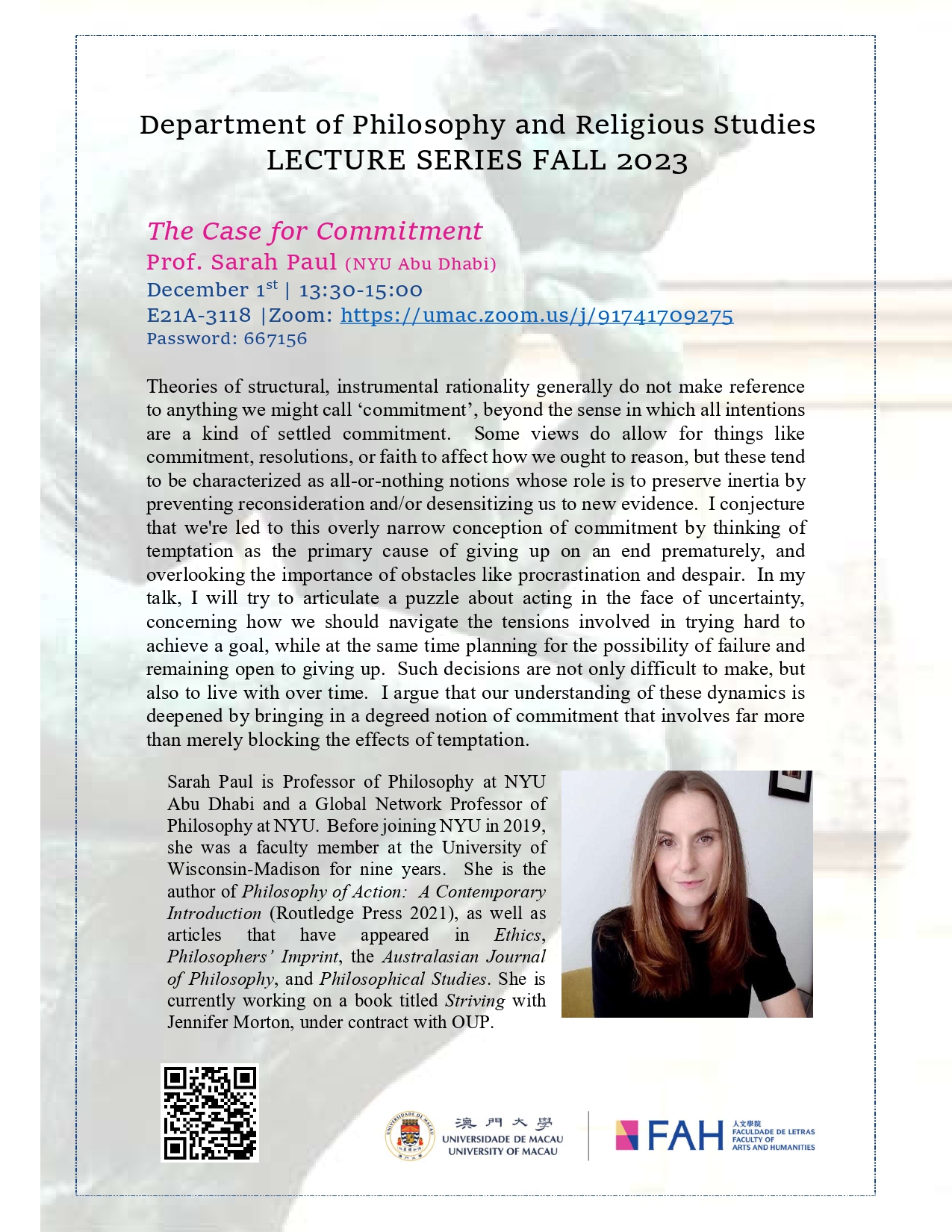Calendar of Events
M Mon
T Tue
W Wed
T Thu
F Fri
S Sat
S Sun
1 event,
FAH/DPHIL: The Mario Echano Prize for the Best Undergraduate Philosophy Essay
The Mario Echano Prize for the Best Undergraduate Philosophy Essay is awarded for excellence in philosophy. Students enrolled in the Department of Philosophy and Religious Studies undergraduate courses are eligible to enter an essay for the annual award. Students are invited to submit an academic essay written as an assignment in one of the Department of Philosophy and Religious Studies’ undergraduate courses this academic year (AY2023/2024). Essays of any length are acceptable. The organisers reserve the right not to award the prize if essays are not of sufficiently high standard. Please submit essays by e-mail with the subject line ‘Submission for the Mario Echano Prize’ to Maggie Wong at MaggieWong@um.edu.mo. Attach your essay to the message as a Microsoft Word document (other […]
2 events,
FAH/DPHIL Lecture Series – “The Problem of Contingency for the Descriptivist Account of Semantic Deference” by Dr. Ryo Tanaka, University of Tokyo, Japan
FAH/DPHIL Lecture Series – “The Problem of Contingency for the Descriptivist Account of Semantic Deference” by Dr. Ryo Tanaka, University of Tokyo, Japan
Zoom: https://umac.zoom.us/j/98680905452 Password: 382583 Abstract Semantic deference is a phenomenon where the referents of linguistic expressions in an ordinary speaker’s vocabulary are determined by the use of the expressions by a group of experts about the relevant subject matter. For example, the meanings of terms such as ‘elm,’ ‘beech’ and so on for an ordinary speaker are partly determined by what botanists in her community say about the relevant tree kinds. Traditionally, the phenomenon has been taken to motivate semantic externalism, according to which meanings “ain’t in the heads” (Putnam 1975) of individual speakers. Those who challenge this tradition, however, attempt to provide a fully internalist-descriptivist account of semantic deference. On the internalist proposal, semantic deference is a matter […]
2 events,
FAH/DPHIL Lecture Series – “Art as Inquiry: The Path of Chinese Lyric Aesthetic” by Prof. Danielle Macbeth, Haverford College, U.S.A.
FAH/DPHIL Lecture Series – “Art as Inquiry: The Path of Chinese Lyric Aesthetic” by Prof. Danielle Macbeth, Haverford College, U.S.A.
Zoom: https://umac.zoom.us/j/99485044779 Password: 455548 Abstract Beginning with music, through the emergence of lyric poetry, and culminating in the literati brush-and-ink landscapes of the Southern Song, something happened, something Kao Yu-kung calls Chinese lyric aesthetic. What is at issue for us here is the nature and character of this happening. I begin with a characterization of the fundamental orientation of Chinese thinkers (as contrasted with that of Indo-European thinkers), then turn briefly to the thought of Confucius and of Zhuangzi to expose the intellectual and existential roots of the lyric tradition. The lyric tradition itself is explicated as a working out of the Zhuangzian ideal of resonating, mirroring things as they are. Since our conception of Chinese lyric aesthetic can […]
2 events,
FAH/DPHIL Lecture Series – “Viewing Humans and the World Through Affairs” by Prof. Yang Guorong, East China Normal University, China
FAH/DPHIL Lecture Series – “Viewing Humans and the World Through Affairs” by Prof. Yang Guorong, East China Normal University, China
Zoom: https://umac.zoom.us/j/91442748446 Password: 038288 Abstract Understanding and shaping the world are always related with the transformation of the world from its original state into the actual world. The world in its original state is the world as it is of itself. It is only when humans function in the world in their various ways that the questions of understanding and shaping the world arise. The processes of people functioning in the world are also the processes of the unfolding of “affairs” (shi). Affairs (shi) are primarily interrelated with actual human activity. According to Chinese philosophy, “affairs are action” and “all affairs in the world arise from conduct.” “Affairs” also refers to the outcomes of people’s conduct and action. An […]
2 events,
FAH/DPHIL Lecture Series – “The Case for Commitment” by Prof. Sarah Paul, NYU Abu Dhabi
FAH/DPHIL Lecture Series – “The Case for Commitment” by Prof. Sarah Paul, NYU Abu Dhabi
Zoom: https://umac.zoom.us/j/91741709275 Password: 667156 Abstract Theories of structural, instrumental rationality generally do not make reference to anything we might call ‘commitment’, beyond the sense in which all intentions are a kind of settled commitment. Some views do allow for things like commitment, resolutions, or faith to affect how we ought to reason, but these tend to be characterized as all-or-nothing notions whose role is to preserve inertia by preventing reconsideration and/or desensitizing us to new evidence. I conjecture that we're led to this overly narrow conception of commitment by thinking of temptation as the primary cause of giving up on an end prematurely, and overlooking the importance of obstacles like procrastination and despair. In my talk, I will try […]







